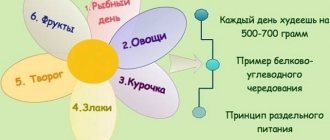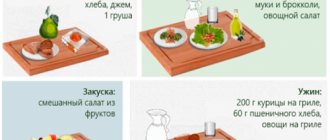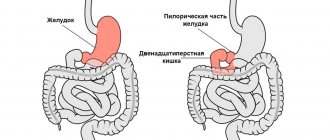Diet No. 3 is a special nutrition program developed by the famous Soviet scientist, gastroenterologist-nutritionist Manuil Pevzner. This therapeutic diet is prescribed for chronic intestinal diseases accompanied by constipation. Problems with regular bowel movements are quite common, most often caused by poor diet, sedentary lifestyle and poor quality food. Most working people, as well as students, are exposed to all these factors. Also, diet No. 3 is often prescribed to older people, since intestinal motility worsens with age.
Chronic, prolonged constipation leads to serious complications such as colitis and rectal diseases. The third diet according to Pevzner will prevent these consequences in time. Read more about the diet, what you can eat, how to cook and how to finally return to the regular menu.
What should you eat?
Article on the topic: Dietary borscht and chicken soufflé. Menu and recipes for treatment table No. 2
- day-old rye bread and bran bread – up to 250-300 g per day
- necessarily once a day or more often - vegetarian soups (cabbage soup, borscht, beetroot soup, fresh vegetable soups
- 1 time a day - lean meat, for example, boiled beef, rabbit, lean pork, poultry (without skin)
- 1 time a day – low-fat boiled or steamed fish; seafood
- vegetables – tomatoes, carrots, beets, lettuce, zucchini, cucumbers, pumpkin, cauliflower, broccoli in the form of salads and cooked (stewed, boiled)
- parsley, dill, celery, bay leaf
- refined vegetable oil (linseed, olive, corn, sunflower), butter - up to 25 g per dish
- baked potatoes with skin or boiled in their jackets
- salted (but not pickled) vegetables
- sweet berries and fruits, pink and red grapes, black currants, cherries; honey, jam, marshmallow, marmalade, milk caramel
- Once a day – be sure to have cereals (oatmeal, buckwheat)
- 1-2 times a week – eggs
- milk, low-fat kefir, fresh low-fat cottage cheese, fermented milk products without flavorings or additives
- weak tea, herbal teas
- fruit and vegetable juices – up to 150 ml per day
- the vinaigrette
- 1-3 times a week – seaweed
- Once a week – mild cheese
- 1 time per week – low-fat sausage
- wheat or oat bran
When diet number 3 is a necessity
Gentle nutrition is an integral part of the course of treatment of any diseases of the gastrointestinal tract. One of the most common and unpleasant symptoms that one has to deal with when there is a disruption in the functioning of the gastrointestinal tract is constipation. Pain and discomfort negatively affect the functioning of the body and the quality of life in general. Eating the right foods, coupled with drug therapy, helps to quickly restore motor skills and improve well-being.
In addition to irregular bowel movements, table number 3 helps to cope with other problems caused by difficulties during bowel movements. It can also be prescribed to relieve hemorrhoids and disorders of the integrity of the anal mucosa.
Prohibited
- fresh bread, white bread, bread and pastries made from premium flour, baked goods, puff pastry products
- fatty meat, fish, poultry
- canned and smoked meats
- spicy foods, fatty foods
- boiled eggs
- potatoes, vermicelli
- cooking fats, animal fats
- turnips, radishes, radishes, onions, garlic; mushrooms; jelly
- dogwood, quince, blueberry; hot and fatty sauces
- pepper, horseradish, mustard; strong tea, natural coffee
- cocoa, chocolate, pastry cream, ice cream
- alcohol
Diet "Table No. 3"
Indications
- atonic constipation;
- intestinal diseases outside the acute phase.
Cooking rules
Dishes and products should enhance intestinal motility. Food is prepared in crushed form, boiled in water, or steamed or baked. Vegetables and fruits are used raw or boiled.
Recommended diet
Bread products:
wheat bread made from second grade flour, grain bread, doctor's bread, day-old rye bread, savory cookies, dry biscuits, savory baked goods with fruits and berries.
Cereals and pasta:
buckwheat, millet, wheat, barley cereals in the form of crumbly porridges, boiled in water or with the addition of milk, casseroles.
Milk and dairy products:
milk, fermented milk drinks, cream, mild cheese, sour cream, fresh cottage cheese, puddings, lazy dumplings, cheesecakes.
Soups:
soups with weak, low-fat meat and fish broth, vegetable broth, vegetable soups, borscht, cabbage soup, beetroot soup, first courses with pearl barley, fruit soups.
Meat and meat dishes:
lean meats, chicken, turkey, and occasionally dairy sausages.
Fish and fish dishes:
low-fat fish, boiled or baked, seafood.
Vegetables:
raw or boiled beets, carrots, tomatoes, lettuce, cucumbers, zucchini, pumpkin, cauliflower, boiled white cabbage.
Eggs and egg dishes:
eggs are allowed up to two per day, soft-boiled, steamed and egg white omelettes.
Appetizers:
raw vegetable salads and vinaigrettes with vegetable oil, vegetable caviar, fruit salads.
Lean ham, soaked herring, meat and fish in the form of jellied dishes. Berries and fruits:
fresh, ripe, sweet, raw fruits and berries.
Dried fruits in soaked form. Sweets:
honey, jam, marmalade, pastille, milk caramel.
Drinks:
weak tea, coffee substitutes, rosehip and wheat bran decoction, fruit and vegetable juices.
Foods and dishes that need to be excluded
Bread products:
bread made from premium flour, puff pastry and pastry products.
Cereals and pasta:
rice, semolina, sago, vermicelli, legumes.
Milk and dairy products:
sharp, salty cheeses.
Soups:
soups with strong broth.
Meat and meat dishes:
fatty meats, as well as duck, goose, smoked meats and canned meat.
Fish and fish dishes:
fatty fish, smoked meats, canned fish.
Vegetables:
radish, radish, garlic, onions, turnips, mushrooms, potatoes.
Eggs and egg dishes:
hard-boiled or fried eggs.
Snacks:
fatty and spicy dishes, smoked meats.
Berries and fruits:
jelly, blueberries, quince, dogwood.
Sweets:
chocolate and chocolate products, products with cream.
Drinks:
cocoa, natural coffee, strong tea.
Sample diet menu No. 3 for a week
Monday
- Breakfast: low-sour cottage cheese with fresh fruit, weak tea.
- Lunch: vegetable soup with turkey meatballs, slices of toasted bread.
- Afternoon snack: crackers with raisins, juice.
- Dinner: buckwheat with steamed chicken, fresh tomato or vegetable salad.
- Before bed: a glass of apple juice.
Tuesday
- Breakfast: omelet with cheese and steamed tomatoes, endive with milk or cream.
- Lunch: beetroot soup with bread.
- Afternoon snack: tea with meringues or marshmallows.
- Dinner: meat casserole with cauliflower.
- Before bed: a little yogurt.
Wednesday
- Breakfast: two soft-boiled eggs, boiled milk sausage, tea.
- Lunch: diet borscht, seasoned with sour cream, bread.
- Afternoon snack: baked apples with honey, a little cinnamon.
- Dinner: stewed rabbit or veal cutlets, vegetable salad.
- Before bed: a few prunes, juice.
Thursday
- Breakfast: milk oatmeal with chopped dried apricots, tea.
- Lunch: fish soup with herbs, bread.
- Afternoon snack: dry bread, weak tea without milk, fruit.
- Dinner: carrot pancakes with sour cream, juice.
- Before bed: kefir.
Friday
- Breakfast: steam omelette, sandwich with homemade meat or fish pate, weak tea without milk.
- Lunch: broth with meat and vegetables, crackers.
- Afternoon snack: 2 types of bread toast, honey, tea or juice.
- Dinner: baked fish, vinaigrette.
- Before bed: natural yogurt, dried apricots.
Saturday
- Breakfast: zucchini pancakes with sour cream, tea.
- Lunch: vegetable soup with mushroom broth, crackers.
- Afternoon snack: fresh fruit.
- Dinner: steamed cauliflower, boiled veal or a piece of lean pork.
- Before bed: yogurt.
Sunday
- Breakfast: oatmeal with fresh fruit, chicory with cream.
- Lunch: okroshka (without potatoes).
- Afternoon snack: vegetable salad dressed with oil.
- Dinner: noodle soup with minced meat, juice.
- Before bed: a handful of prunes.
Important!
The medical diet “Table No. 3” is prescribed exclusively by the attending physician, based on the medical history and studies performed.
Indications for prescribing the diet
Indications for prescribing the diet are chronic gastrointestinal diseases with a predominance of constipation outside the period of exacerbation.
Table 3 is a therapeutic diet that is prescribed for chronic constipation.
In addition, the diet is used for hemorrhoids and anal fissures, when constipation should not be allowed to occur.
Recipes for the table No. 3
Be sure to eat liquid food once a day. Soups are prepared from a whole piece of meat in a second broth; it is also good to use borscht and various cold soups in the menu. It is better to give preference to vegetable decoctions. Let's consider a complex version of cold vegetable soup and several unusual recipes from ordinary products.
Dietary beetroot
Have to take:
- 2 medium boiled beets;
- a slice of lemon;
- 0.5 liters of low-fat kefir;
- 1 tbsp. l. Sahara;
- chopped parsley and dill.
One beet should be cut into cubes, and the second should be grated on a fine or coarse grater. Squeeze the juice out of the grated one. Also cut the lemon into small pieces. Place beet cubes and lemon in a plate, sprinkle with sugar, pour kefir and beet juice on top. Add greens and stir. Keep the finished soup in the refrigerator.
Carrot jelly
Have to take:
- 100 g carrots;
- 50 g sugar;
- 10 g gelatin;
- citric acid.
Peeled carrots should be cut into arbitrary cubes or strips and cooked until fully cooked. Then pour half of the water into a separate container, pour sugar and citric acid into it, and bring to a boil. Grind the carrots with the remaining broth until smooth. Mix syrup, carrot mass and prepared gelatin. Divide the jelly into portions and cool in the refrigerator.
Diet mayonnaise
Have to take:
- 1 egg yolk;
- 50 ml vegetable oil;
- 1 tsp. sugar or substitute;
- 2 tsp. citric acid solution.
Beat the yolk with sugar or xylitol, slowly adding vegetable oil. When the mass becomes thick and homogeneous, you need to add citric acid to it and mix everything. This sauce is also suitable for diabetes.
To make it easier to create your therapeutic diet, consider a sample menu for a week for diet number three.
Exercises for constipation. Does it help or not?
In my experience, it really helps! Active and mobile children are less likely to suffer from constipation. To prevent constipation, exercise is useful: running, swimming, gymnastics, squats, bending, abdominal strengthening exercises.
A child suffering from constipation, in addition to following a diet and drinking regime, is recommended to perform several simple actions in the morning:
— Get up early so that you have enough time for all morning activities, including going to the toilet, — Drink 1 glass of cold water on an empty stomach (you can with a mixture of dried fruits), — Perform the following exercises — Starting position standing: take as deep a breath as possible, then take a deep breath exhale, then pull your stomach in as much as possible and stick it out. Repeat the exercises several times. There is a high probability that after this the child will want to visit the toilet. Abdominal massage is also useful.
general characteristics
The goal of the diet is to restore impaired intestinal functions, stimulate mucosal regeneration processes, and restore impaired metabolism. The diet is aimed at enhancing peristalsis, with the goal of bowel movement with the inclusion of mechanical, physical and temperature stimuli in the diet.
General characteristics:
a physiologically complete diet with a normal content of proteins, carbohydrates and fat, 30% of which is vegetable oil. The content of vitamins and minerals corresponds to the needs of a healthy person. The food temperature is normal.
The diet includes dishes rich in plant fiber, but not irritating the gastrointestinal mucosa. Food can be prepared in any form (mainly unchopped, steamed or boiled in water).
Chemical composition and calorie content
- proteins - 100 g,
- fats - 90-100 g,
- carbohydrates - 400 g,
- table salt - 6-8 g,
- retinol - 2 mg,
- thiamine - 4 mg,
- riboflavin - 4 mg,
- nicotinic acid - 30 mg,
- ascorbic acid - 100 mg,
- calcium - 0.8 g,
- phosphorus - 1.2 g,
- magnesium - 0.5 g,
- iron - 0.015 g,
- free liquid - 1.2-1.5 l,
- calories - 2500-2900 kcal.
Diet:
4-5 times a day, at the same hours. Long breaks in time between individual meals are unacceptable.
Consultation on therapeutic nutrition (diets 1-15 according to Pevzner)
- last name, first name, patronymic of the subject of personal data;
- Date of Birth;
- place of residence (region/city);
- Mobile phone number;
- email address (e-mail);
- history of requests and views on the Site and its services (for Site visitors);
- other information (the given list may be shortened or expanded depending on the specific case and purposes of processing).
3.3.
The operator ensures that the content and volume of the processed personal data corresponds to the stated purposes of processing and, if necessary, takes measures to eliminate their redundancy in relation to the stated purposes of processing.
3.4.
The operator processes biometric personal data subject to the written consent of the relevant subjects of personal data, as well as in other cases provided for by the legislation of the Russian Federation.
3.5.
The Operator does not process special categories of personal data relating to race, nationality, political views, religious or philosophical beliefs.
3.6.
The Operator does not carry out cross-border transfer of personal data.
Purposes of collecting personal data
4.1. Personal data is processed by the Operator for the following purposes:
- ensuring the organization of medical care to the population, as well as the most complete fulfillment of obligations and competencies in accordance with Federal Laws of November 21, 2011 No. 323-FZ “On the fundamentals of protecting the health of citizens of the Russian Federation”, dated April 12, 2010 No. 61-FZ “On circulation of medicines”, Rules for the provision of paid medical services by medical organizations, approved by Decree of the Government of the Russian Federation of October 4, 2012 No. 1006;
- implementation of labor relations;
- implementation of civil law relations.
- organization and implementation of a set of measures aimed at maintaining and (or) restoring health and including the provision of medical services, including prevention, diagnosis and treatment of diseases;
- implementation of remote interaction of LLC “Clinic of Immunology and Allergology No. 1” with patients and other interested parties within the framework of service and information services through the use of telephone communications, instant messaging services, IP telephony, email
- implementation of remote interaction of LLC “Clinic of Immunology and Allergology No. 1” with patients and other interested parties through the website of LLC “Clinic of Immunology and Allergology No. 1” on the Internet;
- organizing and conducting events aimed at increasing awareness and loyalty towards LLC “Clinic of Immunology and Allergology No. 1”, as well as promotion;
- conducting contractual work not related to the main activities of LLC “Clinic of Immunology and Allergology No. 1”,
- within the framework of the emergence, change and termination of legal relations between LLC “Clinic of Immunology and Allergology No. 1” and third parties, as well as the execution of powers of attorney to represent the interests of the Operator;
- participation of LLC “Clinic of Immunology and Allergology No. 1” in civil, arbitration, criminal, administrative processes and execution of judicial acts;
- filling vacant positions in LLC “Clinic of Immunology and Allergology No. 1” with applicants who most fully meet the Operator’s requirements;
- compliance by LLC "Clinic of Immunology and Allergology No. 1" with the requirements of labor legislation, legislation on labor accounting and remuneration
- preserving the life and health of employees of LLC "Clinic of Immunology and Allergology No. 1" during their work activities and identifying health problems and medical contraindications to work among employees of LLC "Clinic of Immunology and Allergology No. 1" (including examination for medical contraindications to driving a vehicle ), as well as compliance with the requirements of current legislation for the investigation and recording of accidents that occurred with employees of LLC “Clinic of Immunology and Allergology No. 1”;
- implementation of LLC "Clinic of Immunology and Allergology No. 1" as an employer of the responsibilities provided for by the Labor Code of the Russian Federation to pay employees due wages, compensation and bonuses, to make pension and tax contributions, as well as settlements with contractors and patients;
- organizing training, advanced training and knowledge testing for employees of Clinic of Immunology and Allergology No. 1 LLC, assessing the business and personal qualities of employees of Clinic of Immunology and Allergology No. 1 LLC and the results of their work, as well as assessing the satisfaction of employees of Clinic LLC immunology and allergology No. 1” with their work;
- registration of travel documents for employees of Clinic of Immunology and Allergology No. 1 LLC, as well as booking and purchasing hotel rooms and transport tickets in the interests of employees of Clinic of Immunology and Allergology No. 1 LLC sent on business trips;
- facilitating communications between employees of LLC “Clinic of Immunology and Allergology No. 1” by maintaining a directory of contact information for employees of LLC “Clinic of Immunology and Allergology No. 1”;
- ensuring the personal safety of employees of Clinic of Immunology and Allergology No. 1 LLC, other persons visiting real estate (premises, buildings, territory) of Clinic of Immunology and Allergology No. 1 LLC, as well as ensuring the safety of material and other assets managed by the LLC “Clinic of Immunology and Allergology No. 1”;
- allocation/connection of computing resources, creation of new users in the information systems of LLC "Clinic of Immunology and Allergology No. 1", providing access to the resources of information systems of LLC "Clinic of Immunology and Allergology No. 1", as well as solving problems that arise for users in the process of working with computers (hardware and software) and office equipment;
- recording information on the use of corporate landline and mobile communication services by employees of LLC “Clinic of Immunology and Allergology No. 1”;
- conducting an independent audit of the accounting (financial) statements of LLC “Clinic of Immunology and Allergology No. 1” in order to express an opinion on the reliability of such statements;
- organization and implementation of internal quality control of medical care and internal production processes at LLC “Clinic of Immunology and Allergology No. 1”;
- conclusion of any contracts with subjects of personal data and their further execution;
- Conducting promotions, surveys, interviews, testing and research on the Sites by the Operator;
- providing personal data subjects with the Operator’s services, as well as information about new services, including advertising ones;
- feedback from subjects of personal data, including processing of their requests and appeals, informing about the operation of the Site;
- monitoring and improving the quality of the Operator’s services, including those offered on the Site;
- maintaining personnel work and organizing records of the Operator’s employees, regulating labor and other relations directly related to them;
- generation of statistical reporting;
- carrying out economic activities;
- implementation of other functions, powers and duties assigned to the Operator by the legislation of the Russian Federation.
Legal grounds for processing personal data
5.1. The legal grounds for the processing of personal data by the Operator are:
- Constitution of the Russian Federation;
- Labor Code of the Russian Federation dated December 30, 2001 No. 197-FZ;
- Code of the Russian Federation on Administrative Offenses dated December 30, 2001 No. 195-FZ;
- Federal Law of November 21, 2011 No. 323-FZ “On the protection of the health of citizens in the Russian Federation”;
- Federal Law of July 27, 2006 No. 149-FZ “On information, information technologies and information protection”;
- Federal Law of July 27, 2006 No. 152-FZ “On Personal Data”;
- Requirements for the protection of personal data during their processing in personal data information systems (approved by Decree of the Government of the Russian Federation of November 1, 2012 No. 1119);
- Regulations on the specifics of processing personal data carried out without the use of automation tools (approved by Decree of the Government of the Russian Federation of September 15, 2008 No. 687);
- Administrative Regulations of the Federal Service for Supervision in the Sphere of Communications, Information Technologies and Mass Communications for the implementation of the state function “Maintaining a register of operators processing personal data” (approved by Order of the Ministry of Communications and Mass Media of the Russian Federation dated December 21, 2011 No. 346);
- Administrative regulations for the execution by the Federal Service for Supervision in the Sphere of Communications, Information Technologies and Mass Communications of the state function of exercising state control (supervision) over the compliance of the processing of personal data with the requirements of the legislation of the Russian Federation in the field of personal data (approved by Order of the Ministry of Communications and Mass Media of the Russian Federation dated 11/14/2011 No. 312);
- The composition and content of organizational and technical measures to ensure the security of personal data during their processing in personal data information systems (approved by Order of the Federal Service for Technical and Export Control of the Russian Federation dated February 18, 2013 No. 21);
- The composition and content of organizational and technical measures to ensure the security of personal data during their processing in personal data information systems using cryptographic information protection tools necessary to fulfill the requirements established by the Government of the Russian Federation for the protection of personal data for each level of security (approved by the Order of the Federal Service Security of the Russian Federation dated July 10, 2014 No. 378).
- statutory documents of the Operator;
- agreements concluded between the Operator and subjects of personal data;
- consent of personal data subjects to the processing of personal data;
- other grounds when consent to the processing of personal data is not required by law.
Procedure and conditions for processing personal data
6.1. The processing of personal data by the Operator is carried out in the following ways:
- non-automated processing of personal data;
- automated processing of personal data with or without transmission of received information via information and telecommunication networks;
- mixed processing of personal data.
6.2.
List of actions performed by the Operator with personal data: collection, systematization, accumulation, storage, clarification (updating, changing), use, distribution (including transfer), depersonalization, blocking, destruction, as well as carrying out any other actions in accordance with the current legislation of the Russian Federation.
6.3.
The processing of personal data is carried out by the Operator subject to obtaining the consent of the subject of personal data (hereinafter referred to as Consent), with the exception of cases established by the legislation of the Russian Federation when the processing of personal data can be carried out without such Consent.
6.4.
The subject of personal data decides to provide his personal data and gives Consent freely, of his own free will and in his own interest.
6.5.
Consent is given in any form that allows you to confirm the fact of its receipt. In cases provided for by the legislation of the Russian Federation, Consent is issued in writing.
6.6.
The condition for terminating the processing of personal data may be the achievement of the purposes of processing personal data, the expiration of the Consent or withdrawal of Consent by the subject of personal data, as well as the identification of unlawful processing of personal data.
6.7.
Consent may be revoked by written notice sent to the Operator by registered mail.
6.8.
When processing personal data, the operator takes or ensures the adoption of the necessary legal, organizational and technical measures to protect personal data from unauthorized or accidental access to it, destruction, modification, blocking, copying, provision, distribution of personal data, as well as from other unlawful actions in relation to personal data.
6.9.
The storage of personal data is carried out in a form that makes it possible to identify the subject of personal data for a period no longer than required by the purposes of processing personal data, except in cases where the period for storing personal data is established by federal law, an agreement to which a party, beneficiary or guarantor, under which is the subject of personal data.
6.10. When storing personal data, the Operator uses databases located on the territory of the Russian Federation.
Updating, correction, deletion and destruction of personal data, responses to requests from personal data subjects for access to personal data
7.1.
If the fact of inaccuracy of personal data or the illegality of their processing is confirmed, the personal data must be updated by the Operator, or their processing must be stopped accordingly.
7.2.
The fact of inaccuracy of personal data or illegality of their processing can be established either by the subject of personal data or by the competent government bodies of the Russian Federation.
7.3.
At the written request of the subject of personal data or his representative, the Operator is obliged to provide information about the processing of personal data of the specified subject by him. The request must contain the number of the main document identifying the subject of personal data and his representative, information about the date of issue of the specified document and the issuing authority, information confirming the participation of the subject of personal data in relations with the Operator (contract number, date of conclusion of the contract, conventional verbal designation and (or) other information), or information otherwise confirming the fact of processing of personal data by the Operator, signature of the subject of personal data or his representative. The request can be sent in the form of an electronic document and signed with an electronic signature in accordance with the legislation of the Russian Federation.
7.4.
If the request of the personal data subject does not reflect all the necessary information or the subject does not have access rights to the requested information, then a reasoned refusal is sent to him.
7.5.
In the manner provided for in clause 7.3, the subject of personal data has the right to demand that the Operator clarify his personal data, block it or destroy it if the personal data is incomplete, outdated, inaccurate, illegally obtained or is not necessary for the stated purpose of processing, as well as take measures provided by law to protect your rights.
7.6.
When the goals of processing personal data are achieved, as well as in the event that the subject of personal data withdraws Consent, personal data is subject to destruction if:
- The operator has no right to carry out processing without the Consent of the subject of personal data;
- otherwise is not provided for by the agreement to which the subject of personal data is a party, beneficiary or guarantor;
- otherwise is not provided for in another agreement between the Operator and the subject of personal data.
Collection of personal data using the site
8.1.
The website of Clinic of Immunology and Allergology No. 1 LLC uses “cookies” and collects the following information about visitors in order to improve the site: IP address of the visitor, date and time of visiting the site, types of browser and operating system, type and model of mobile device.
8.2.
When using electronic services and providing personal data through the website of Clinic of Immunology and Allergology No. 1 LLC, the user’s information will not be used by Clinic of Immunology and Allergology No. 1 LLC for any other purposes other than to meet his specific needs.
8.3.
By using this site and/or providing LLC “Clinic of Immunology and Allergology No. 1” with his personal data, the site user agrees to the processing of his personal data under the conditions provided for in this Policy.
8.4.
In case of disagreement with this Policy, the user should not use this site and provide LLC “Clinic of Immunology and Allergology No. 1” with his personal data.
Final provisions
9.1.
All relations relating to the processing of personal data that are not reflected in this Policy are regulated in accordance with the provisions of the legislation of the Russian Federation.
9.2.
The operator has the right to make changes to this Policy. When changes are made to the current edition, the date of the last update is indicated. The new edition of the Policy comes into force from the moment it is posted on the Site, unless otherwise provided by the new edition of the Policy.
9.3.
This Policy is subject to publication on the official website https:// https://smartclinic59.ru//. The current version of the Policy on paper is stored at the address: 614000, Perm region, Perm, st. Pushkina, 6.
General characteristics of dietary table No. 3
Diet No. 3 fully satisfies a person’s physiological needs for energy and nutrients.
It provides stimulation of peristalsis through the inclusion of mechanical and temperature stimuli in the diet. Fiber-rich foods are recommended. The diet includes an abundance of plant fiber, mainly in the form of salads from fresh vegetables, grated on a coarse grater.
Products that provoke fermentation processes in the intestines, as well as fatty and fried foods that negatively affect other organs of the digestive system are excluded from the diet.
Diet No. 3 provides for fractional meals 4-6 times a day, at the same time, without long breaks between meals. Food is prepared uncut, preferably boiling, baking or steaming. It is recommended to drink cold water or juice on an empty stomach, and fermented milk drinks and dried fruit compotes at night.
Constipation is a very common problem in children. Why?
With the start of complementary feeding, babies' stools most often improve.
This is due to the introduction of fiber into the child’s diet, as well as an increase in the child’s physical activity. But after 1 year, the number of children suffering from constipation begins to increase again. This is due to giving up breastfeeding, switching to solid foods, and reducing the amount of water in the diet. Approximately every fifth child suffers from constipation after one year. How to deal with this problem? For your health - recommendations from the pediatrician of the ENT Plus clinic, a doctor of the highest category, Anna Gennadievna Marakulina.










